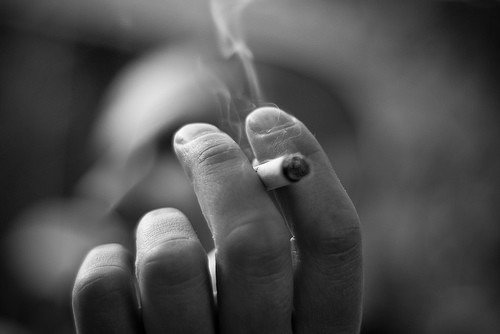License To Smoke? Cigarette Permit Under Consideration

A smoker's license: Orwellian overreach of the nanny state or savvy tobacco control strategy consistent with regulations of other controlled substances?
Smokers already have to pay extra taxes to get their fix, take their smoke breaks on the curb, and confront stern health warnings or in some cases, gruesome and graphic labels on their packs. Yet they still reach for their tobacco.
Public health advocates have floated the idea of a smoker's license before – in 2008, the advisory board Health England proposed requiring a government permit to buy cigarettes. At the time, Health England chairman and London School of Economics professor Julian Le Grand described it as a kind of “libertarian paternalism” – not banning cigarettes outright, but using fees and paperwork to prod people to kick the habit or not smoke in the first place.
The kind of smoker's license proposed by University of Sydney public health researcher Simon Chapman is somewhat similar, and would be available in varying grades, each of which would allow a person to buy a certain amount of cigarettes per week. Chapman laid out his argument for the license in an article in the journal PloS Medicine on Tuesday.
While Chapman noted that governments often require licenses for access to guns and dangerous chemicals, his primary model for the smoker's license approach is prescription requirements for pharmaceuticals, which he likens to “temporary licenses.”
“While prescriptions are strictly speaking a prescriber’s note of authority to a pharmacist to dispense restricted drugs to a named individual, the prescription system is in effect a system of temporary licensing to use restricted substances,” Chapman wrote.
To get their “temporary license” for medication, people have to pay doctors and pharmacists. Their prescription entitles them to a certain amount of their drug, and they can use that prescription to prove they are allowed to possess these medications.
The whole prescription requirement is predicated on the notion that some medications are potentially dangerous and habit-forming – milder drugs can be bought over-the-counter. But all cigarettes are over-the-counter items, Chapman points out.
“In contrast to the highly regulated way we allow access to life-saving and health-enhancing pharmaceuticals, this is how we regulate access to a product that kills half its long-term users,” Chapman writes.
University of Edinburgh public health researcher Jeff Collin, while critiquing the concept of smoker's license, sympathizes with Chapman's aims.
“It is indeed an historical absurdity that so dangerous a product should be so readily available,” Collin wrote in his piece for PLoS Medicine.
But previous efforts to curtail smoking, like workplace bans, work because they marry health concerns with broad norms. A smoker's license, on the other hand, would exacerbate the stigmatization of smokers – who tend to be poorer – and kick up fierce opposition from anti-authoritarians, civil liberties groups and the tobacco industry, according to Collin.
“The proposal to require licenses will inevitably be widely perceived as demeaning, onerous and punitive,” Collin says.
While it's hard to imagine such an idea catching on in the U.S., certain local health departments might be more welcoming. After all, the idea of trans fat bans and soda regulations might have sounded silly to New Yorkers just a few years ago. What sounds like a public health researcher's pipe dream one day could be a mayor's crusade tomorrow.
© Copyright IBTimes 2024. All rights reserved.





















